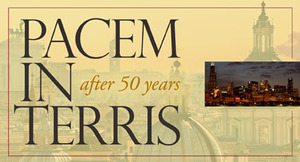50 years after Blessed John XXIII published Pacem in Terris, an encyclical that promoted peace in a world tortured by war and various other forms of unrest, still is relevant today. Crucially so. Pacem in Terris was the first papal letter address to “all people of good will.” It followed the Cuban missal crisis. The importance of this encyclical is not important merely for social concerns, but for true peace among peoples, solidarity and justice. Justice and mercy are the parameters of life and the path of the journey in building, confessing Jesus Christ, though it was hoped that non-believers would take note of what was contained therein. The goal of the papal teaching was to provide “an opening of spaces of freedom and dialogue.”
Among the points of PT that we have to remember (and see echoes in the teachings of later popes):
• People should take an active role in public life and organizations and influence them from within (147)
• Humans should carry on temporal activities “as acts within the moral order” (150).
• A unity between faith and action is needed; solid Christian education will help achieve this unity
(152-153).
• Distinguish between false philosophical ideas and movements deriving from them (159).
• Christians need prudence in determining when to collaborate with non-Christians in social and economic affairs (160).
• “Peace will be but an empty sounding word unless it is founded on the order which the present document has outlined in confident hope: an order founded on truth, built according to justice, vivified and integrated by charity, and put into practice in freedom” (167).
Vatican Radio carried a piece today on Pacem in Terris with Pope Francis’ remarks. A few paragraphs are excerpted here:
The Encyclical, Pope Francis said, reminds us that the basis of peace-making exists in mankind’s “divine origin” and thus everyone, from individuals and families to society and States are called to “build peace, on the example of Jesus Christ… by promoting and practicing justice with truth and love…(and) contributing…to integral human development” through solidarity. And that means an end to “egotism, individualism, and group interests at every level.”
But has today’s world learned any lessons from Pacem in Terris? the Pope asked: “Are the words justice and solidarity” found “solely in our dictionary or are we all working to realize them?”
Pacem in Terris reminds us that “there can be no real peace and harmony if we fail to work for a more just” and jointly supportive society, the Pope said.
And if man, and indeed, society and authorities themselves share a common divine origin, then every human being shares a common dignity “to promote, respect and safeguard always.”

